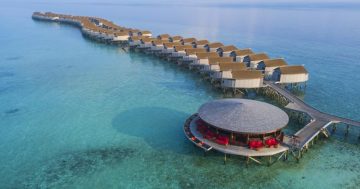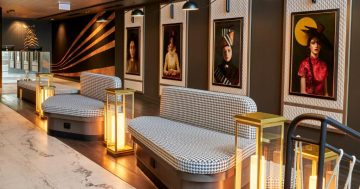By Rama Gaind.
| This is the first of a two-part feature on India’s most populous city and a luxury brand’s first hotel in India – Sofitel BKC Mumbai. |
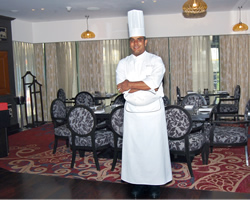
Chef Jankidas Vaishnav, specialty vegetarian chef at Tuskers Restaurant, Sofitel BKC Mumbai, India.
There is nothing haphazard about Mumbai, India. The teeming millions, an attractive mix of a bygone British epoch and the uber-cool modern era to its sprawling slums and the forever-congested traffic – they can all be unnerving.
The cacophony of sounds is deafening, at first, but everyone appears unfazed until the realisation that, surprisingly, there’s a method to what feels like pandemonium. It doesn’t take long to realise that a certain calm surrounds what can be described as an orchestrated symphony of sights and sounds. You extricate yourself from the encircling hustle and bustle … only to get caught up in the melodious rhythm of it all!
Mumbai is the capital of India’s Maharashtra state, the most populous city in India – and the fourth in the world – with an estimated population of 21 million. It is also the wealthiest. As the financial, commercial and entertainment capital, it has the highest number of millionaires and billionaires among all the cities in India.
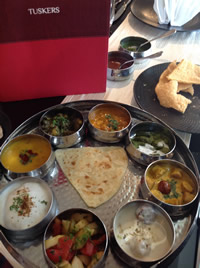
A hearty meal is a vegetarian thali at Tuskers, Sofitel BKC Mumbai. Photo: Rama Gaind
Built on what was once an archipelago of seven islands, this bustling city on the banks of the Arabian Sea motivates, fascinates and enthralls. The skyline is dotted with seemingly endless rows of bold, high-rise skyscrapers and luxury malls that rise up in a flash, creating an endless megalopolis that serves as a backdrop to Marine Drive. The ‘Queen’s Necklace’ extends its long tarmac promenade along the seafront.
Mumbai is home to three UNESCO World Heritage Sites: the Elephanta Caves, Chhatrapati Shivaji Maharaj Terminus (also known by its former name Victoria Terminus) and the city’s distinctive ensemble of Victorian and Art Deco buildings.
Sofitel’s best
It is fitting to find the first hotel of the luxury chain in India – Sofitel Mumbai BKC –located in the city’s active Bandra Kurla Complex business district. The hotel features a modern architectural style that blends perfectly with its surrounding urban landscape, but a taste of the splendour to come is evident from the décor that skillfully combines Indian culture with French inspiration.
It’s aptly been said the hotel is a key address combining the best of each country’s culture. French elegance, savoir-faire and art de recevoir coupled with India’s rich heritage of personalised service, tradition of luxury and depth of culture will provide a backdrop for a memorable stay. The subtle blend of design, gastronomy and culture was orchestrated into a stay that heightened all the five senses.
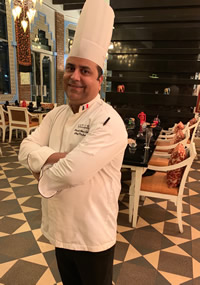
Chef de cuisine Shadab Ahmed Qureshi at the Jyran Restaurant, Sofitel BKC Mumbai. Photo: Rama Gaind
The surrounds of the 14-storey hotel reverberate class and stylishness with a touch of edgy, sharp boldness and confidence. The use of angular glass, natural marble, intricately layered chandeliers, gold and diamond replicas, stately furnishings and other bespoke design elements form a signature style.
The hotel displays an elegant mélange of Indian and French cultures, which is evident from the first moment of entry, through the grand lobby. The waiting area is adorned with delicate Indian columns, vibrantly weaved carpets and is furnished with classic French furniture. The canted glass façade pays tribute to diamonds, one of India’s most revered and popular exports. Custom-made crystal and glass chandeliers crown the atrium lobby. Stone artwork, reminiscent of ancient Indian temples, is incorporated in the reception area, bordered by brick-shaped mirrors that add a distinctly contemporary appeal. A large metal fretwork wall-feature fabricated in three types of stainless steel with backlighting adds glamour and warmth.
There is also cause to rejoice in the gastronomic extravaganza that’s on offer. The Pondichéry Café is ideal for all-day dining; Club Millésime is the executive lounge and bar where manager Merwyn Sequeria imparted a wealth of knowledge about the ceremonial nature surrounding wines, elaborating on the numerous different aromas; and Tuskers is a specialty restaurant where chef Maharaj Jankidas Vaishnav ensured the best in a pure vegetarian feast, while Rohit Bhamburkar and Anna Wewle provided attentive service. Artisan is the Parisien bistro and the ultra-modern Bar Diamantaire features India’s first tower-style wine cellar.
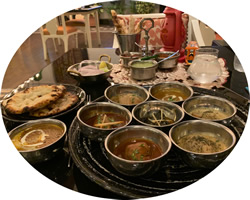
Enjoy a delectable array of vegetarian and non-vegetarian food at Jyran, Sofitel BKC Mumbai. Photo: Rama Gaind
The excellent all-vegetarian Tuskers takes its meat-free environment seriously – with a separate delivery area to ensure there’s no contamination of produce.
Chef Vaishnav has dedicated creative flair, ensuring regular menu changes offer delectable fare. Undiyo is a green vegetable curry you only get to eat in November-December; aloe vera kadhi is made with dried aloe vera, yoghurt tempered with curry leaves, mustard seeds and asafetida; dhokla is fresh and tasty; and an acquired taste is necessary for sangri ke kofte, a traditional Rajasthani dish of cottage cheese dumpling filled with pickled bamnera beans and cooked in tomato and yoghurt. Angoori rasmalai was a melt-in-your mouth dessert!
Jyran delights
Then there’s the delectable fare at the tandoori restaurant named Jyran that remains the talking point for days to come. Jyran means ‘lost love’ in Persian and the name is symbolic of the hope, new beginnings and emotions that follow. Inspired from the northwest Indian frontier, a land of warriors and poets, Jyran is designed with celebration and drama in mind.

The impressive exterior of the Sofitel BKC Mumbai, India.
The bar at the entrance to the hotel’s signature restaurant gives a sense of welcome and warmth. The interiors are complemented by intriguing influences from palace-style windows to informal timber seating and an imaginative blend of materials in an art-deco inspired dining area.
A fusion of styles is where attention has been given to detail, from the chandeliers, fabrics to intrinsic patterns and drapes. Vivid colours of red, green and yellow are blended well and genial to the eye.
The relaxed lounge-style of Jyran invites its guests to sink into cushion-strewn seats and as cocktails are mixed at the bar, mouth-watering aromas drift from the open kitchen.
What makes this restaurant so exceptional is that it serves Indian food, but with a sense of élan and confidence. Chef de cuisine Shadab Ahmed Qureshi has a passion for food and excels in serving creative, flavoursome cuisine. Dining on the final day of the Kashmiri festival awakened my sense of culinary adventure.
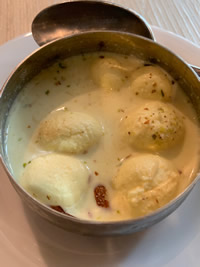
Appetising dessert – rasmalai – at Tuskers, Sofitel BKC Mumbai, India. Photo: Rama Gaind
Delving into north India’s zesty cuisine with remarkable curries and a delectably smooth black dal was a treat. The traditional Kashmiri lamb broth was sublime, the tomato broth tempered with whole coriander and cumin was hot and tangy; an assortment of meat kebabs were splendidly tender; small portions in a thali was an ideal way to taste a variety of curries; and sweet mango lassi provided welcome respite to the palate. Nawabi cuisine is aromatic, rich with nuts, with a selection of Kashmiri sweets bringing the evening to a relaxing end. Oh, don’t miss out on seeing Jyran’s local resident – a beautiful elephant sculpture perched above a glittering pool!
After such a resplendent lunch and dinner, going outdoors for sightseeing the next day was placed on hold.
At the Sofitel BKC Mumbai … “Life is Sensation. Life is Precision. Life is Magnifique”.
Mother Teresa’s comment comes to mind being pertinent for the occasion:
“Kind words can be short and easy to speak, but their echoes are truly endless.”
DETAILS BOX
Sofitel BKC Mumbai
C-57, Bandra Kurla Complex, Bandra (East), Mumbai, India
T: +91 (22) 6117 5000/2642 5000









